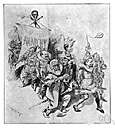Of course others have made the same points that Kirk has made about the role of radical socialism in Australasia between the 1890s and World War I: indeed he notes at one point that "to argue in these ways is to endorse the somewhat unfashionable view of Verity Burgmann, Lloyd Churchward and others that the influence of Marxist and
syndicalist ideas on Australian socialism has been underestimated by labour historians of this period." (117) Similarly, Erik Olssen's The Red Feds: Revolutionary Industrial Unionism and the New Zealand Federation of Labour 1908-1913 (New York: Oxford University Press, 1988) does likewise for New Zealand.
They will careen off into the darkest side of the political night, and end up in the dustbin of history, where they can rub elbows with those other yellows, the early-twentieth-century 'Yellow Socialists' of the proto-fascist
syndicalist Pierre Bitry.
As a counterpoint to this market-based definition of free, Husni-Bey screened Postcards from the Desert Island, 2010, a twenty-two-minute video set at Ecole Vitruve, a Paris elementary school modeled on the pedagogy of
syndicalist Celestin Freinet.
Instead, revolutionaries should build revolutionary
syndicalist 'living unions' which enable workers to develop themselves through direct struggle against capital.
Parliament has approved on Tuesday the government-drafted Labour Syndicates Law, after months of heated debates about its articles, which was seen as an attempt to control
syndicalist work and absorb it into the framework of the state.
Those were the people in Carlo Tresca's faction of Italian-American trade unionism (on the libertarian
syndicalist side), who took to rioting anti-fascistically in the aftermath of Mussolini's March on Rome, in 1922.
Syndicalist thought became increasingly prominent with Georges Sorel serving as a typical, and particularly influential, representative.
He added: "But, of course, there was another remarkable tradition associated with Tonypandy (where riots had broken out in 1910 in response to a lockout by mine owners), the Miners' Next Step (a radical manifesto written by a group of miners' leaders), the Unofficial Reform Committee, which was industrial unionist and
syndicalist. It was a very diverse kind of political tradition."
A core part of three of the volumes under consideration centres on the operations of international anarchist and
syndicalist networks as they emerged in the context of this increased radicalism.
This idea informed Symbolist, Futurist, Acmeist (an early twentieth-century group of Russian poets who opposed the aesthetic preoccupations of the Russian Symbolists), and Formalist movements, as well as the thinking of the French
syndicalist, Georges Sorel, whose thought in turn would influence Alexander Bogdanov's Red Star of 1908.
Mick McGahey [the Communist vice-president of the NUM] described him privately as a degenerate
syndicalist. He believed that picketing was the essence of the dispute and wasn't really interested in getting wider public support.
 syndicalist - an advocate of anarchism
syndicalist - an advocate of anarchism